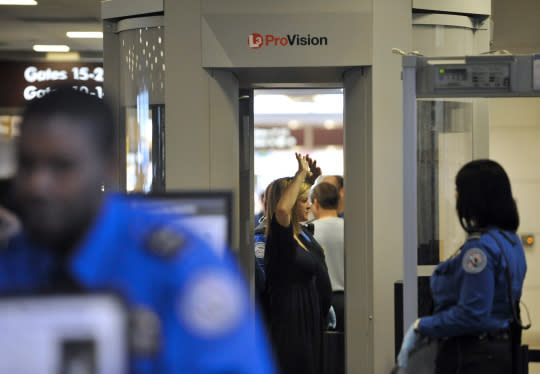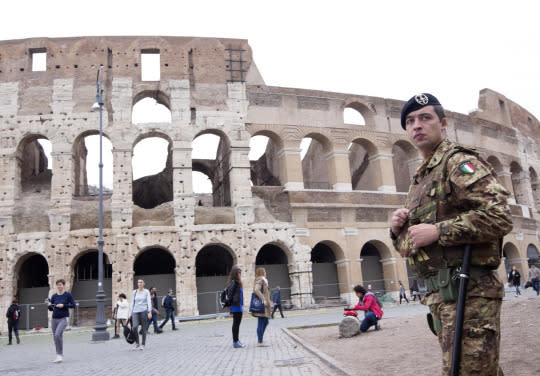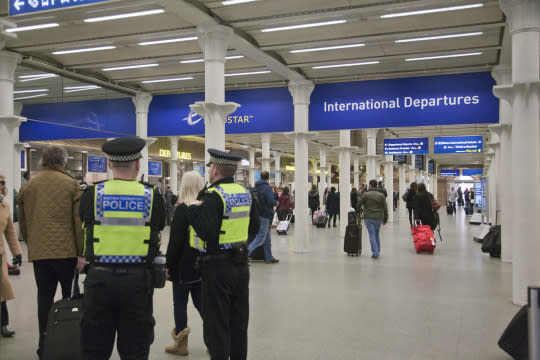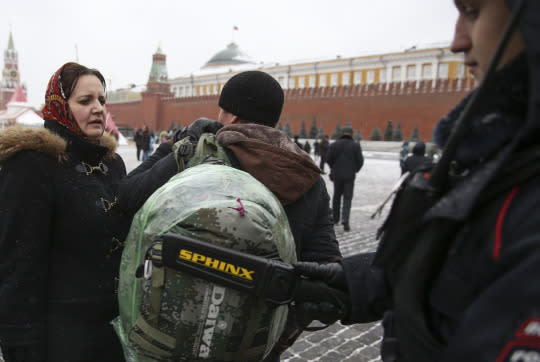U.S., London, and Rome Threatened: Where Is It Safe to Travel?

Washington, D.C., has responded to the Paris attacks and threats from the Islamic State by beefing up security around the Capitol. (Photo: Corbis)
As devastating as Friday’s attacks on Paris were, there is an added fear emerging for people traveling abroad or even domestically: that this is just the start of a concerted effort to terrorize major Western cities, including those in the U.S.
The Islamic State had already threatened Washington, D.C., London, and Rome over Twitter after the Paris attacks Friday that left at least 129 people dead. Then on Monday came an unverified ISIS video with an armed man saying, “By God, as we struck France in the center of its abode in Paris, then we swear that we will strike America at its center in Washington.”
So, then, should people be putting off their travels to destinations Westerners have usually taken for granted to be safe? What is the threat, really?
The odds of being a victim of terrorism remain low. But for some, whether or not to travel might simply come down to a person’s comfort level with the inherent risks or their need to get someplace.
“I would not advise clients against travel to any of these locations,” George Taylor, VP of global operations for risk-management firm iJet, told Yahoo Travel. “All travelers should have a plan regardless of the threat level. This plan should include a communications plan and regular check-in with a responsible party.”
Taylor added that between Washington, London, and Rome, as well as Russia — also a target of threats this weekend — none of them stood out as more dangerous than the other.
On the other hand, Kathy Bedell, senior vice president of BCD Travel, which manages corporate trips, told Yahoo Travel after the threats to Washington, Rome, and London, “We’re telling our clients to send travelers to destinations with elevated risk levels only for business-critical trips.”
Related: Is Paris Safe for Tourists Now?
The biggest cause for concern is that some analysts do believe ISIS is shifting its strategy from Syria and Iraq, where it is coming under increasing fire, toward the West. As Clint Watts of the Foreign Policy Research Institute told Agence France-Presse, “We’ll see them increasingly move away from conventional and insurgent operations in Iraq and Syria and more toward terrorist attacks in their extended network.”

Heavily armed New York City police officers with the Strategic Response Group stand guard in Times Square on Saturday. Despite the deployment, NYPD said it knew of no specific threats. (AP Photo/Mary Altaffer)
After the Paris attacks, the U.S. Department of Homeland Security went on record saying that it and the FBI have found “no specific or credible threats of an attack on the U.S. homeland of the type that occurred in Paris.” When Yahoo Travel contacted the TSA about any changes in security at U.S. airports, it referred to the same statement.
However, U.S. airports were already increasing security after the downing of a Russian commercial jetliner in Egypt last month, and scrutiny seems to be greater now. Two passengers were asked to leave a Boston-bound American Airlines flight on Sunday after the flight crew reported “suspicious activity,” according to the Metropolitan Washington Airports Authority. The passengers were released after being questioned by police.
Washington, D.C., police deployed extra officers to high-profile targets, such as the Capitol, although it repeated Homeland Security’s statement that there were no specific threats made.
The only recent attacks in Washington have involved the White House, and there have been no injuries: In 2014, a man jumped the White House fence and sprinted into the front door, though he was arrested soon after and said he was only trying to warn President Obama that the “atmosphere was collapsing.”
In a scarier incident in 2011, a 21-year-old man with no militant connections named Oscar Ramiro Ortega-Hernandez fired seven bullets that hit the White House.

An airport security screening in Washington, D.C., since security was heightened. (Photo: Corbis)
Of course, Washington was also a target in the Sept. 11 attacks of 2001, as well as the 2002 Beltway sniper attacks that killed 10 people.
Although New York City wasn’t specifically threatened recently, it too is taking the Paris attacks seriously. The city has deployed a new counterterrorism unit around key areas, including Times Square, where heavily armed officers were standing guard. As in Washington, no tourist attractions or transportation have been affected.

An armed guard outside the Colosseum in Rome. (Photo: Corbis)
Italy, which has received repeated threats from ISIS this year, reacted to the Paris attacks by declaring a terrorist alert for the whole country and deploying military forces to the Vatican and other prime targets. But those targets will remain open to tourists, and in fact a major event is just around the corner: The Vatican’s Jubilee Year of Mercy begins Dec. 8, and it is expected to receive millions of pilgrims.
In July, Italian police arrested two men with links to ISIS who were allegedly planning attacks on Italian landmarks.
Maria Gabriella Landers, a founder of Italy tour operator Concierge in Umbria, told Yahoo Travel she hasn’t seen any concern from upcoming clients about travel to Rome or elsewhere in the country. While she said the decision on whether to travel is up to each person and that the company checks on potential security concerns, she advocated travel to the country despite the threats.
“I would probably say that in the world today, anything can happen anywhere, and you can’t hide in your house, hoping to avoid danger,” Landers said. “The best thing that you can do is to get out and experience the world, meet people, and, as [travel expert] Wendy Perrin puts it, be “an ambassador for your country.”
Related: What to Do in a City Where’s There’s Been a Terrorist Attack
London’s last Islamist attack on civilians was in 2005, the coordinated July 7 bombings of the Underground and a double-decker bus that killed 52 people and injured more than 700. But that doesn’t mean the city and the U.K. haven’t faced serious threats since — Prime Minister David Cameron told Radio 4 that British intelligence has foiled seven attacks this year alone.

London has also increased security at key spots such as its airports. (Photo: Corbis)
Since the Paris attacks, Britain has sent its elite special forces to back up undercover police in key London areas such as train stations, the Underground, shopping centers, social hubs, and popular sites. The Telegraph reported that up to 450 radicalized British citizens are estimated to have returned to the U.K. from Syria.
Still, there are no reports of tourist sites being closed, and except for the extra security, it’s business as usual.
Russia, which was also threatened by ISIS via video in recent days, isn’t as popular a tourist site among Westerners, especially since the conflict with Ukraine that started in early 2014. Greg Tepper, president of Exteter International, which operates tours in Russia, said he expects tourism to bounce back in 2016, however, thanks to “pent-up demand.”
Related: Travel in the Age of ISIS: The Terrifying New Reality
As Italy and the U.K. have done, Russia has increased its security of prime targets in recent days, including railways and airports. Despite the threat of Chechnyan Islamic militants, there have been no major terror attacks in the country in the past few years, though there was an attack on Moscow’s Domodedovo airport in January 2011 that killed 37 and two suicide bombings in Moscow’s subway in 2010 that left 40 dead.

A backpack check at Moscow’s Red Square. (Photo: Corbis)
Tepper assured anyone planning to visit Russia that “Russian security, particularly near important tourist sites, is very tight, and while I have not seen anything specifically change since Friday, I can imagine that security has gotten a bit tighter now.”
How best to stay safe in your travels? If you’re going abroad, it’s highly advisable to check the U.S. State Department’s website for travel alerts and warnings, plus security information about every destination. You can also enroll in the State Department’s Smart Travel Enrollment Program (STEP), which helps you and those close to you stay informed during a crisis.
Beyond that, Taylor of iJet recommends such precautions as minimizing time in public areas, being alert to sudden increases in security, and, if you find yourself in the earliest stages of an attack, to run.
Related: Paris Closes the Eiffel Tower and Other Tourist Sights Indefinitely
You can also consider a membership with Global Rescue, which advises clients on dangerous areas and, when necessary, rescues them. Scott Hume, associate director of security operations with the company, told Yahoo Travel that Global Rescue advised some clients in Paris when the attacks happened, but there was no need for rescues. He added that the company has recently received a “significant increase in the number of requests” for information.
When asked for tips on staying safe, Hume advised keeping emergency phone numbers on hand, always having cash in case of an emergency, and having a satellite phone in case cellular networks are shut down.
WATCH: Paris Attacks Likely to Bruise Tourism
Let Yahoo Travel inspire you every day. Hang out with us on Facebook, Twitter, Instagram, and Pinterest. Check out our original adventure travel series “A Broad Abroad.”
